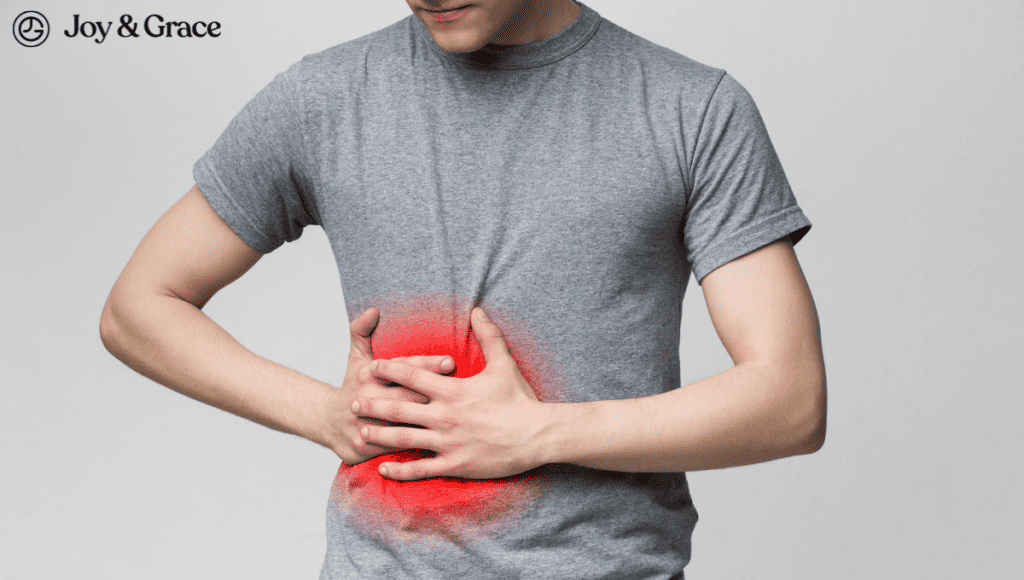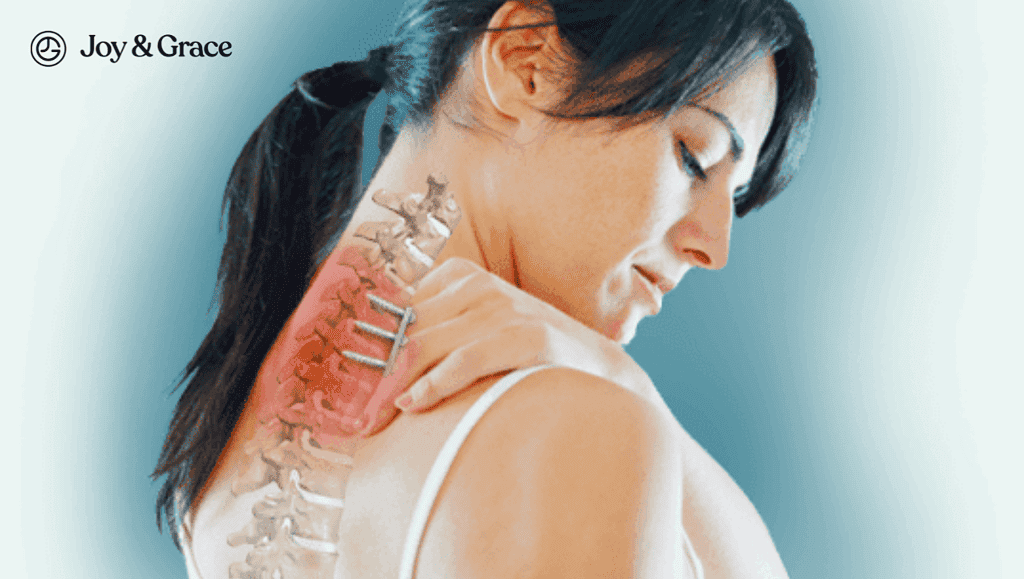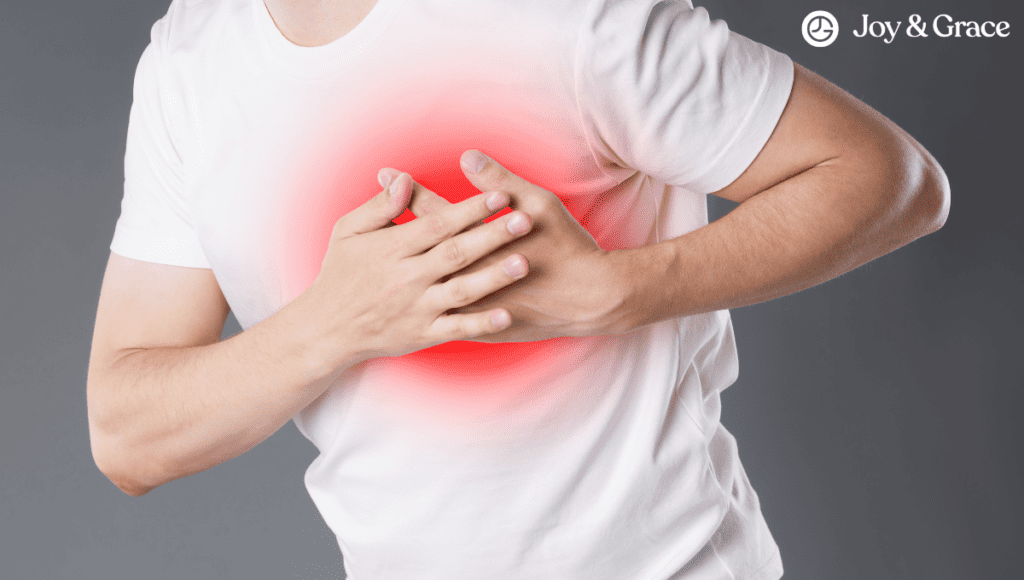If you feel like your shoulder blades are being stabbed, you’re not alone. Many individuals suffer from this pain, which can be debilitating and affect daily activities.
At Joy & Grace, we understand pain's impact on your life. It's our goal to provide you with the information you need to manage your pain effectively. We will share insights, tips, and strategies to help you navigate this pain and regain control of your life.
So, if you are ready to learn more about that stabbing pain near your shoulder blades and find ways to alleviate your discomfort, keep reading. We’ve got you covered.
Why Do I Have A Stabbing Pain In My Back Near My Shoulder Blade?
If you are experiencing sharp stabbing pain in your shoulder blade, you may be wondering what is causing it. Well, to get straight to the point, it’s commonly due to problems with the different tissues that make up and support your shoulder.
The shoulder blade, or scapula, is a large bone on your back connected to your collarbone and upper arm bone. It plays a crucial role in the movement of your arm and shoulder. Numerous muscles (17, in fact!) also support the shoulder blade.
Hence, any injury to these tissues can cause stabbing pain in your back near the shoulder blades. And these injuries are usually due to:
- Muscle strain from overuse, and
- Poor posture
However, albeit more rarely, there are also other potential causes of sharp stabbing pain in the shoulder blade area, including:
- Pinched nerve
- Rotator cuff injury
- Fractures
- Shoulder dislocation
- Various conditions of the spine, such as herniated spinal discs, degenerative disc disease, and spinal stenosis
- Referred pain from the internal organs
Is Pain Under Shoulder Blade Serious?
You may wonder if it’s something to worry about or just a temporary discomfort. The answer is that it could be either, depending on the underlying cause.
Shoulder blade pain from minor muscle strains and poor posture can be handled at home. But pain from injuries, fractures, or spinal conditions all require medical attention.
Random stabbing pains near the shoulder blades are usually not a cause for alarm. However, if the pain persists, worsens, or comes with other concerning symptoms, it's best to seek medical care to rule out any potentially serious conditions.
Additionally, although stabbing pain near your shoulder blades may be simply just that, a pain in your shoulders, pain from other organs can also be felt near your shoulder blade, as we mentioned earlier. And this can also be a sign of a more severe condition.
What Organs Can Cause Shoulder Blade Pain?
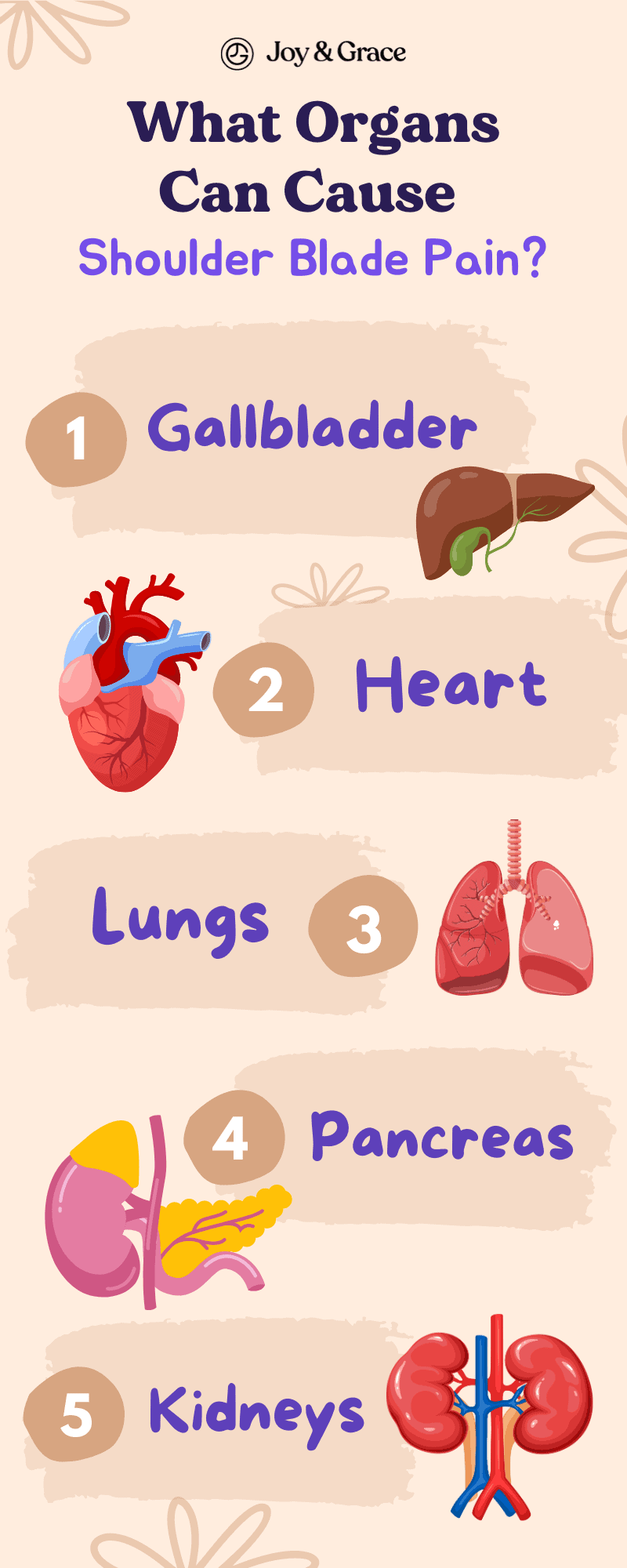
While this type of pain can have a range of causes, some organs may be contributing to your symptoms, including:
- Gallbladder
The gallbladder is a small organ on the right side of your abdomen, just below the liver. Pain from the gallbladder can radiate to the right shoulder blade. Other accompanying symptoms usually include:
- Abdominal pain in the upper right quadrant
- Nausea
- Vomiting
- Bloating
- Indigestion
- Heart
The heart is also a potential cause of shoulder blade pain. Numerous heart conditions can cause pain near your shoulder blade. We’ll talk about those conditions later.
- Lungs
The lungs are another organ that may contribute to shoulder blade pain. Lung cancer or pneumonia can all cause pain in the upper back. However, in addition to pain in the upper back, the following symptoms are also usually present:- Persistent cough
- Shortness of breath
- Chest pain
- Coughing up blood
- Unexplained weight loss
- Pancreas
Stabbing pain in the back near the shoulder blade can also be a symptom of a pancreas problem. This pain may occur due to inflammation of the pancreas or pancreatic cancer, which can cause referred pain in your right shoulder.
- Kidneys
Kidney problems generally do not cause shoulder pain directly. However, certain conditions related to the kidneys can sometimes lead to referred pain that may be felt in the shoulder region.
So when other symptoms accompany that sharp pain in your shoulder blade area, it could signal a more serious condition.
What Serious Conditions Cause Sharp Stabbing Pain In Shoulder Blade?
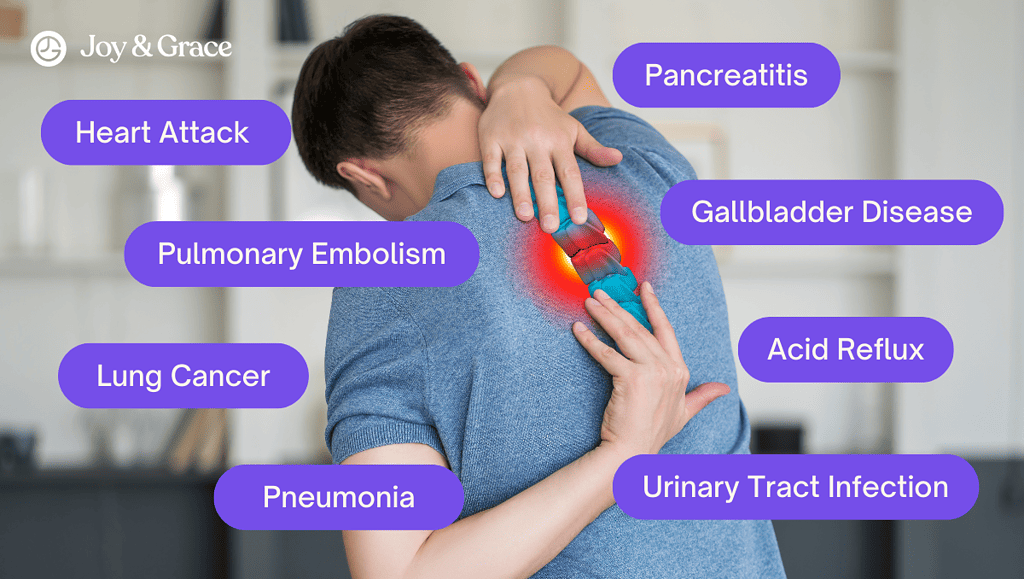
Some possible causes of pain under the left shoulder blade include:
- Heart Attack
Pain near your shoulder blade can be a sign of a heart attack. If you are experiencing chest pain, shortness of breath, and sweating, call 911 immediately.
- Pulmonary Embolism
Pulmonary embolism, a blockage in the lungs' blood vessels, can be a possible cause of sharp pain between the shoulder blades. It occurs when a blood clot travels to the lungs and can result in chest pain that radiates to the back, including the area between the shoulder blades. Pulmonary embolism is a medical emergency, so if you experience sharp pain in this region along with other symptoms like difficulty breathing, rapid heartbeat, or coughing up blood, it's important to seek immediate medical attention. - Lung Cancer
Lung cancer can cause pain in the back near your shoulder blades due to the location of the lungs. Make sure to get regular screenings if you are at risk for lung cancer.
- Pneumonia
Some people may also experience stabbing pain in the back near the shoulder blade. However, this is usually accompanied by:
- Cough
- Fever
- Chest pain
- Shortness of breath
- Pancreatitis
Pancreatitis is inflammation of the pancreas and can cause pain in the upper left abdomen, radiating under your left shoulder blade.
- Gallbladder Disease
Gallbladder disease usually causes pain in the lower right abdomen. However, pain under the right shoulder blade can also occur in patients with gallbladder disease.
- Acid Reflux
Acid reflux can also cause interscapular pain (pain between the shoulder blades), in addition to symptoms like:
- Heartburn
- Regurgitation of stomach acid into the mouth
- Chest pain
- Difficulty swallowing
- A sour taste in the mouth
- Urinary Tract Infection
Shoulder pain from a UTIs is incredibly rare and is usually a result of severe, untreated infections. If you suspect that your shoulder pain is from a urinary tract infection, watch out for more common symptoms like:
- Frequent urination
- A strong urge to urinate
- Pain or burning sensation during urination
- Lower abdominal pain or discomfort
- Cloudy or strong-smelling urine
- Blood in the urine
- Small amounts of urine
- Pain or pressure in the lower back or sides
- Fatigue
- Fever
What Other Heart Conditions Cause Stabbing Pain Near The Shoulder Blades?
Aside from a heart attack, here are other heart-related causes of stabbing pain near your shoulder blades include:
- Pericarditis
Pericarditis is when the sac around the heart (called the pericardium) becomes inflamed.
Various factors can cause pericarditis, including: - Viral or bacterial infections
- Autoimmune disorders
- Heart attacks
- Certain medications
- Trauma or injury to the chest
- Underlying medical conditions like rheumatoid arthritis or kidney failure
This can cause chest pain that may be sharp, stabbing that can move to your back and left shoulder blade.
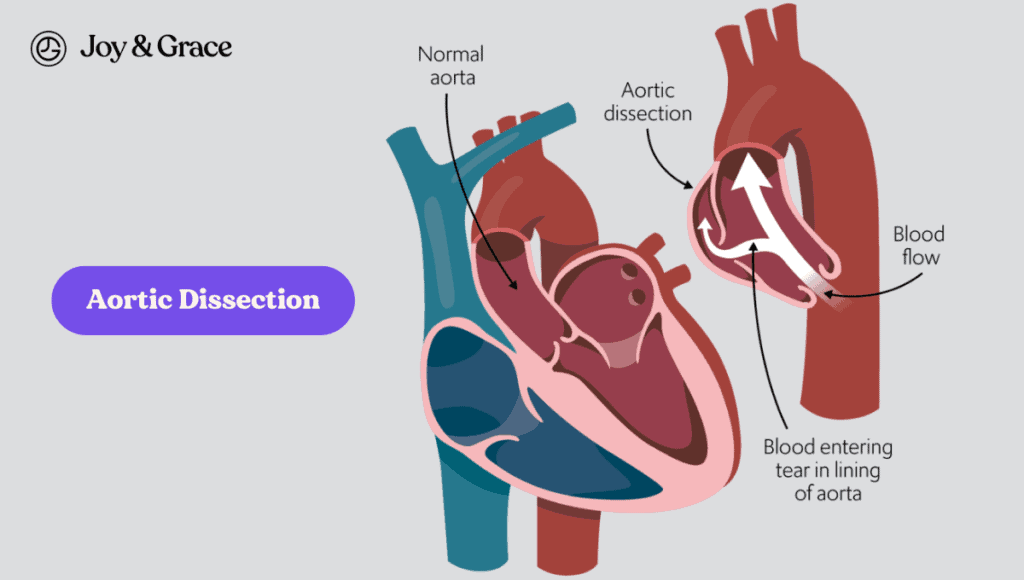
- Aortic Dissection
Aortic dissection is when the main blood vessel that carries blood from the heart tears. This can cause severe pain and is very dangerous.
Like pericarditis, the stabbing pain from aortic dissection can start from the chest and move to the back or under your shoulder blades.
In addition to that, other common symptoms of aortic dissection include:
- Sudden onset of severe chest or upper back pain
- Shortness of breath, dizziness
- Fainting
- Rapid pulse
- High blood pressure
Prompt medical attention is crucial, as aortic dissection is a life-threatening condition that requires immediate medical treatment.
When people think of heart problems, they typically think of chest pain. However, heart-related pain can manifest in other areas of the upper body, including the shoulders and back.
Pain near your shoulder blade may be a warning sign of heart disease, especially if it is accompanied by other symptoms such as:
- Shortness of breath
- Dizziness
- Nausea
- Chest pain
- Sweating
- Fatigue
Can Gas Cause Shoulder Blade Pain?

Excessive gas problems can cause chronic discomfort, indirectly increasing sensitivity to random pains and aches throughout the body, including the shoulder blades. This can be commonly seen in people with irritable bowel syndrome, for example.
However, apart from that indirect link, we found no studies suggesting intestinal gas can directly cause shoulder blade pain. That said, gas from a laparoscopic surgery can cause shoulder pain. This includes laparoscopic hysterectomy.
How Do I Stop Stabbing Pain In My Shoulder Blade?
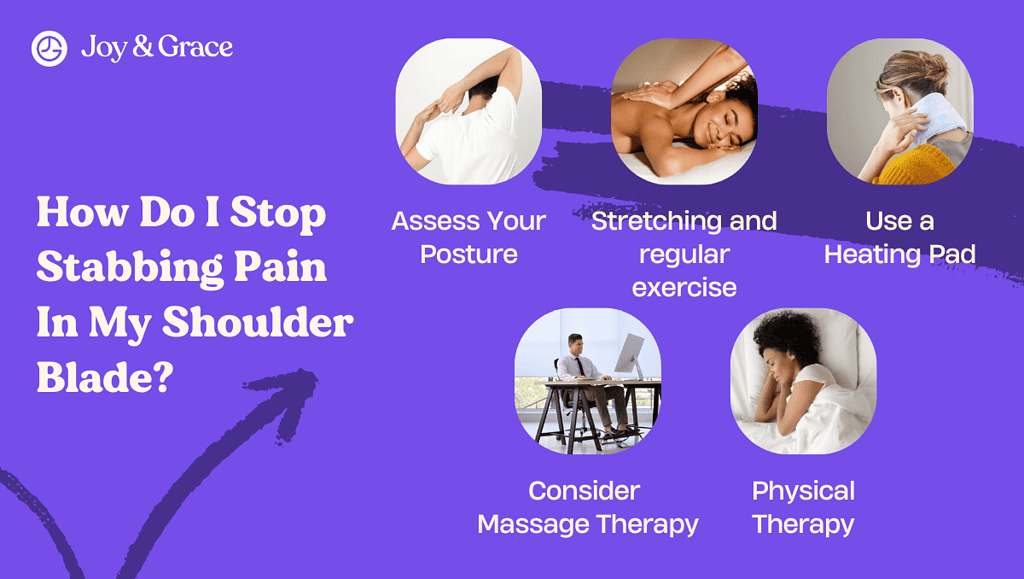
Stabbing pain in the shoulder blade is painful and can be disruptive to your daily routine. The good news is that there are several things you can do to relieve this type of pain. Here are a few solutions to consider:
- Assess Your Posture
Poor posture can cause stabbing pain in your shoulder blade. Avoid awkward body positions, and make sure you are sitting or standing up straight, with your shoulders relaxed and your head held high.
- Stretching and regular exercise
If you spend long hours at a desk, it’s essential to take a break every hour and stretch. Doing some light exercises to keep your muscles relaxed and help them recover from sitting for prolonged periods is advisable. We have a list of neck and shoulder exercises here.
- Use a Heating Pad
A heating pad can work wonders in alleviating stabbing pain in your shoulder blade. It helps soothe your muscles and nerves, improves blood circulation, and promotes relaxation. You can use a heating pad once daily, for 20-30 minutes, until you feel better.
- Consider Massage Therapy
Massage therapy can help to ease the stabbing pain in your shoulder blade. Deep tissue massage can help to relieve the tension in your muscles and promote blood circulation. If you decide to book a massage, make sure you go to a qualified therapist who has experience with shoulder pain.
- Physical Therapy
Physical therapy can help reduce shoulder pain by improving posture and strengthening muscles.
When To Seek Medical Attention
If you are experiencing stabbing pain in your upper back, between your shoulder blades, it's important to pay attention to the severity and duration of the pain.
If the upper back pain is mild and lasts for a few days, it's likely that the pain can be treated at home with the solutions we mentioned above. However, you should seek medical attention if the pain is:
- Severe
- Accompanied by numbness or tingling
- Radiates to your arms, neck, or jaw,
- Persistent and lasts for more than a few days.
It's also important to pay attention to other symptoms that may be present. If the pain is severe and occurs suddenly, seek medical attention immediately. If the pain is accompanied by:
- Fever
- Shortness of breath
- Chest pain
- Nausea
- Vomiting
- Cough
- Abdominal pain
- Yellowish skin color (jaundice)
- Changes in bowel movement
Seek medical attention immediately, as these may be signs of a more severe condition.
Takeaway
Stabbing pain near the shoulder blades can be caused by various factors. However, in most cases, the pain is temporary and can be treated with simple measures, such as:rh
- Resting the affected area and avoiding any physical activities that may aggravate your pain.
- Applying heat to the area
- Stretching or doing gentle exercises to help improve your mobility and prevent your shoulder muscles and upper back muscles from tightening up.
- Massage and physical therapy
But it's important to remain vigilant about any accompanying symptoms that suggest a more serious underlying condition. If you have any concerns about your symptoms, seek medical attention from a medical professional.







